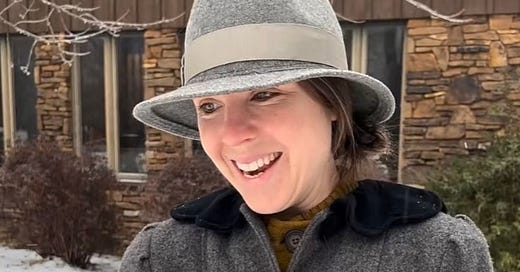Embedded is your essential guide to what’s good on the internet, from Kate Lindsay and Nick Catucci.🧩
I want to believe. —Kate

As countless parents and tweet disclaimers have said, don’t believe everything you read on the internet. Or see, or watch, or otherwise “experience” (that’s the closest you’ll get to me acknowledging the metaverse). It’s generally good practice to prowl the internet with antennas raised, but recently I’ve been feeling like there must be an ulterior motive to anything I see online. And why wouldn’t I, when examples like this are everywhere?
But it’s not just misinformation. It’s the rise of tech-savvy brands and advertising colliding with our insatiable need to true-crimify the things around us that have made it downright impossible to trust anything popular on the internet as genuine—to not wonder if just maybe things are more than they seem.
Take the TikTok user @reallyverycrunchy. The woman behind the account plays the character (is it a character?) of a mom who is granola to the point of parody, walking barefoot through the snow, removing the fake microwave from her child’s play-kitchen, and getting in passive-aggressive battles with other moms who attempt to out-crunch her. Her videos are so detailed that commenters debate about whether or not she is actually doing satire—how could she know that much about the community if she wasn’t genuinely part of it herself?
That’s how it started. Then, people became suspicious of how well-produced her videos are, how much content she’s made in the past few months, and how frequently she mentions products like essential oils. Users made videos theorizing that she was actually there to advertise something, or part of some marketing team trying to sneak its way into our subconscious.
Then BuzzFeed revealed that she’s actually just 33-year-old Emily Morrow, a Kentucky mom who makes these funny videos with the help of her husband. She is somewhat crunchy, but her character is a heightened version of her lifestyle.
“It’s just funny that people think we’re doing this instead of a husband and wife being silly because they’re bored,” she said in response to the conspiracies.
This kind of paranoia isn’t new. Music fans have indulged their own with the concept of the “industry plant.” As in, an artist who presents as an independent musician organically finding fame, but is actually supported and promoted by a major record label. TikTok has massively expanded that term, applying it not just to musicians like Olivia Rodrigo, but anyone whose virality they suspect a company or team is secretly behind.
Then there’s Axel Webber, whose TikTok videos documenting his life in a tiny New York apartment blew up when he was rejected from Julliard (?) And then he got a modeling contract (??). His trajectory is somewhat baffling, so he’s been accused of coming from a rich family or being created by some company or even being a “Hype House plant.” I can’t help it—I’m suspicious of him too!
It’s becoming somewhat maddening to experience everything on this internet with this level of mistrust. Last week, a user named Tash Browne posted her first TikTok about discovering her husband was not only using Tinder, but had purchased a premium membership.
“So this is my divorce outfit,” she says, before taking us on a week-long bender of drinks with friends, spontaneous tattoos, texts from the ex, and other events that box into a narrative so neat that here I go, doubting it all. It’s like a break-up movie told in a series of minute-long dispatches, and over 124,000 followers are along for the ride. It could be to TikTok what LonelyGirl15 was to YouTube, what The Blair Witch Project was to cinema, what the Zola thread was to Twitter. It sounds like a thing, so what if it is?
But what if, like Emily Morrow, Browne is actually, truly herself: a heartbroken soon-to-be divorcee going through a horrible time? The internet was her outlet for a story she does not owe anyone, and now I’m asking her to prove it, give me more. That’s not a fun dynamic for anyone.
I want to believe in the remarkable moments of the internet again, because it’s those things that make the misinformation and anxiety and other downsides so very worth it. And so going forward, the only conspiracy I’ll accept is that the late cat Pot Roast is actually still alive—because that’s a story from the internet I need to not be true.




